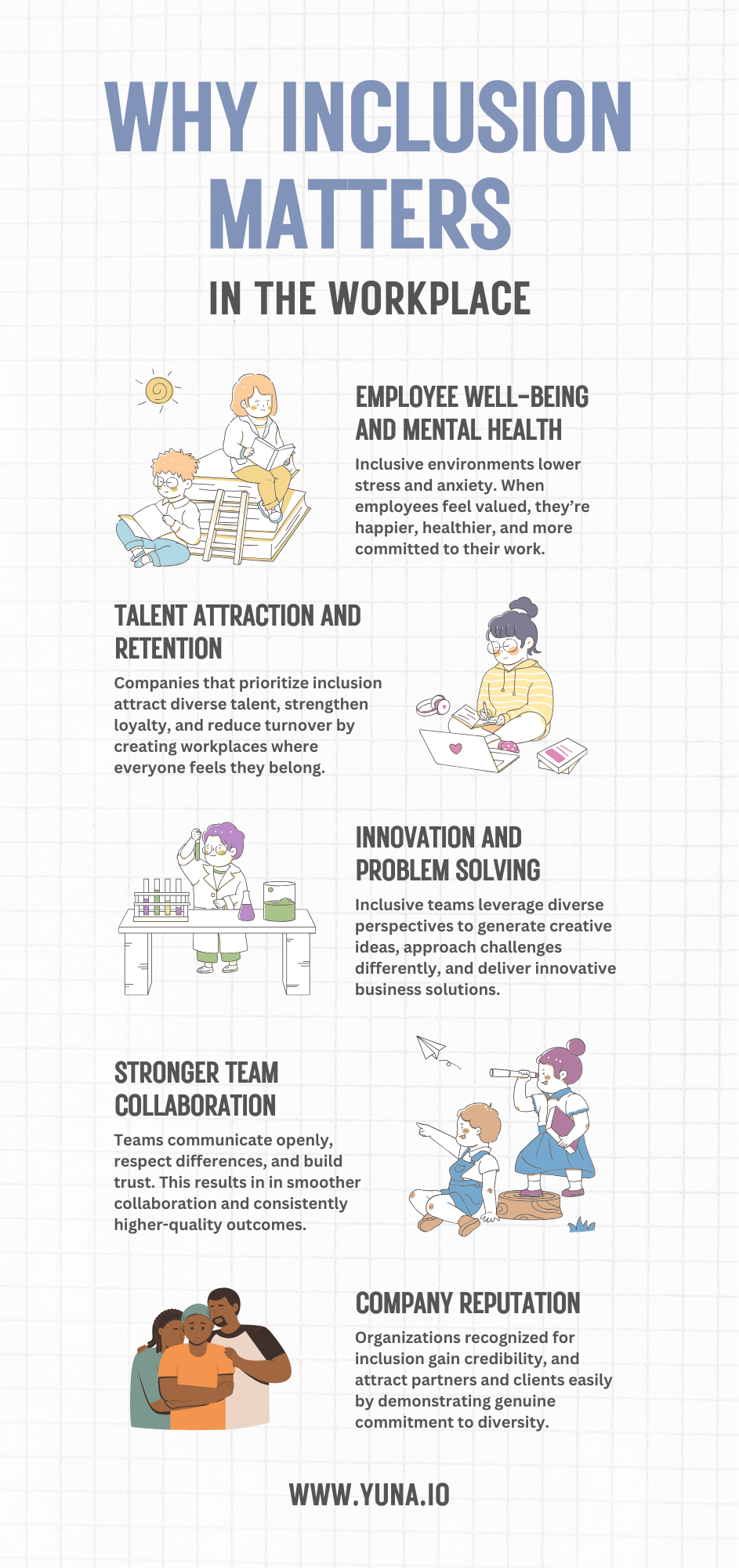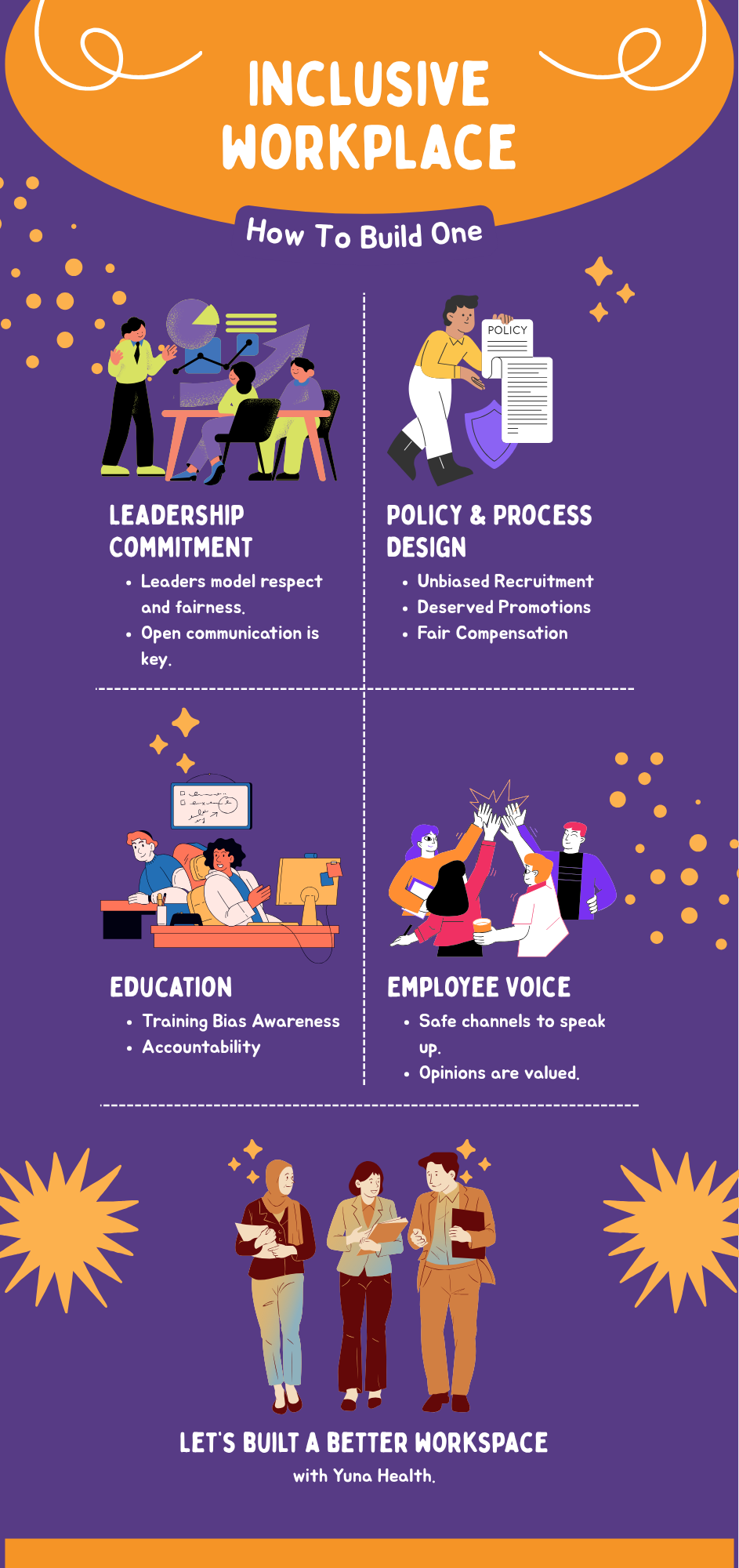Many employees still feel excluded or undervalued at work. Even in organizations that highlight diversity, employees may not feel a sense of true belonging. This is why leaders are now focusing on what is an inclusive workplace and how to build it.
An inclusive workplace culture goes beyond representation. It is about creating an environment where employees feel safe to contribute, respected for their differences, and supported in their growth. When people experience fairness and belonging, they are more likely to be engaged and motivated.
This blog explains the inclusive culture meaning and why it matters for business success. It will explore the importance of inclusion in the workplace, real-life examples, strategies to build inclusivity, and the challenges companies often face. The benefits of a strong inclusive workplace culture will also be discussed. Finally, we will show how Yuna can support organizations in creating a healthier, more inclusive culture.
What is an Inclusive Workplace?
Inclusive culture meaning is often misunderstood. Many companies equate diversity with inclusion, but the two are not the same. Diversity focuses on representation while inclusion ensures that representation is valued and empowered. An inclusive workplace culture is built on fairness, respect, and belonging for all employees.
In a truly inclusive environment, employees feel safe to share their ideas without fear of judgment or dismissal. Psychological safety is a foundation of inclusion because it allows people to express creativity and innovation.
Inclusion also requires fairness in promotions, pay, and recognition. When opportunities are distributed equitably, employees know their contributions matter. This fairness reduces resentment and creates a stronger sense of loyalty.
Finally, inclusive workplace culture means respecting cultural, personal, and professional differences. A company that embraces multiple perspectives gains a richer set of ideas and solutions. This respect builds trust and cooperation across teams.

Why is Inclusion Important in the Workplace?
The importance of inclusion in the workplace cannot be overstated. Inclusive cultures have direct effects on both people and business performance. Let’s explore why inclusion is important in the workplace through several perspectives.
Employee Well-Being and Mental Health
Inclusive workplace culture reduces stress and anxiety. Employees who feel valued experience less burnout. They are more motivated and more likely to stay engaged with their work.
Talent Attraction and Retention
Organizations that embrace inclusivity attract a wider talent pool. Employees stay longer when they feel respected and included. This reduces turnover and recruitment costs.
Innovation and Problem Solving
Diverse and inclusive teams bring stronger solutions to the table. When every voice is heard, challenges are addressed from different angles. This drives innovation and growth.
Stronger Team Collaboration
Inclusion builds trust between colleagues. Teams collaborate more effectively when differences are respected. This creates smoother workflows and stronger results.
Enhanced Company Reputation
Companies known for inclusivity are more appealing to clients and partners. Their reputation helps in building stronger external relationships. This recognition also boosts employer branding.
What Does an Inclusive Workplace Look Like in Practice?
Understanding theory is one thing, but seeing inclusion in action provides clarity. An inclusive workplace culture takes shape through policies, practices, and daily behaviors. Below are some examples of what is an inclusive workplace in real life.
Employee Resource Groups and Mentorship
Employee resource groups create safe spaces for underrepresented groups. Peer and reverse mentoring build bridges between employees at different levels. Together, these foster community and professional growth.
Inclusive Language and Policies
Inclusive workplace culture is visible in language and policies. Neutral and respectful communication makes all employees feel welcome. Inclusive hiring practices remove bias and create fair opportunities.
Recognition of Diverse Holidays and Events
Recognizing cultural observances shows respect for employee identities. Flexible holiday policies allow people to honor traditions. These practices create belonging and appreciation.
Bias Awareness Training & Feedback Loops
Training leaders to identify bias strengthens inclusion. Anonymous feedback channels encourage employees to share honest views. Both strategies improve trust across the organization.

How to Build an Inclusive Workplace Culture
Creating an inclusive workplace culture requires consistent effort. Leaders and employees must work together to embed inclusive practices across the organization. Let’s look at practical strategies.
Leadership Commitment and Role Modeling
Inclusion starts with leadership. When leaders show inclusive behavior, employees follow. Leaders must model respect, fairness, and open communication every day.
Policy & Process Design (Hiring, Promotion, Compensation)
Inclusive workplace culture requires fair systems. Recruitment, promotions, and compensation must be unbiased. Transparent processes help remove favoritism and build trust.
Training, Education & Bias Awareness
Ongoing training helps employees challenge stereotypes. Education ensures that inclusion becomes part of the organizational mindset. Bias awareness programs encourage growth and accountability.
Feedback Systems and Employee Voice
Employees must have safe channels to raise concerns. Feedback systems show that their opinions matter. This creates trust and helps improve policies over time.
Measuring and Holding Accountable
Surveys and metrics help measure inclusion progress. Inclusion KPIs ensure accountability. Companies that measure outcomes are more likely to succeed in building inclusion.
Challenges & Barriers to Inclusion
Even with the best intentions, companies face obstacles when trying to build inclusion. These challenges need attention to create real change.
Unconscious Bias and Resistance to Change
Hidden stereotypes often affect decision-making. Employees may resist new practices due to habit. Overcoming these requires consistent awareness and training.
Lack of Resources or Leadership Engagement
When leaders do not prioritize inclusion, progress slows. Limited resources for training or programs can also block meaningful change.
Tokenism or Performative Inclusion
Some companies show inclusivity only for appearance. This performative approach damages trust. True inclusion requires real actions and measurable results.
Benefits of Strong Inclusive Culture
Strong inclusive culture benefits both employees and organizations. These outcomes show why investing in inclusion is a smart decision.
Increased Productivity and Team Performance
When employees feel included, they are more productive. Teams perform better when everyone contributes. Inclusion strengthens focus and motivation.
Higher Employee Engagement and Satisfaction
Inclusive workplace culture boosts morale. Employees who feel valued are happier in their jobs. They are more likely to give their best every day.
Reduced Turnover and Better Retention
Retention improves when employees feel respected. Reduced turnover lowers rehiring costs. Inclusion supports stability in the workforce.

How Yuna Helps Build an Inclusive Workplace Culture
Yuna supports organizations in building inclusive workplace culture. The platform offers tools that help leaders measure inclusion, track progress, and encourage employee feedback. With structured reminders, insights, and training modules, Yuna makes inclusion more practical and consistent.
Leaders can use Yuna to role model inclusive practices. Employees can access resources that help them engage in fair and respectful communication. Feedback tools within Yuna encourage honesty and help address concerns quickly.
Organizations that adopt Yuna gain support in promoting the importance of inclusion in the workplace. By combining practical tools with structured routines, Yuna helps create a culture of belonging and respect. For companies that want to improve engagement and productivity, Yuna provides a path to a healthier workplace.










